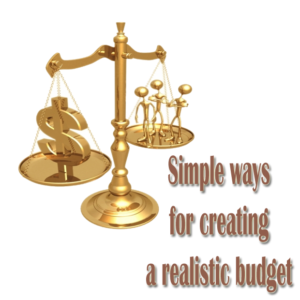 There are plenty of reasons why creating a realistic budget is important. The most common reasons are to have a plan for your money, set and achieve certain financial goals, help you get your finances under control so you can get out of debt and find the funds to pay for that new car, a much needed home renovation, or a down payment on a new home. The list goes on.
There are plenty of reasons why creating a realistic budget is important. The most common reasons are to have a plan for your money, set and achieve certain financial goals, help you get your finances under control so you can get out of debt and find the funds to pay for that new car, a much needed home renovation, or a down payment on a new home. The list goes on.
Here are some Budgeting Strategies:
1. Why did you create your budget?
Keep in mind your reason for creating a budget in the first place.
Surely your intention wasn’t to create a budget so strict that there’s no wiggle room for entertainment or an occasional ice cream cone! Your goal is to be wise about how you spend the money you receive each month.
True, this may mean that you’ve had to cut back on discretionary spending, but the ultimate pay off is being able to do the things you truly want to do.
2. Keep it simple.
Avoid over complicating your plan. Your budget should be simple enough to understand so you’ll be able to use it and adjust it when necessary. The easier it is to use and manage, the more likely you’ll be to stick with it.
3. Be realistic.
Is your budget realistic for you and your family? If you’re planning to cut all your expenses at once, you may be trying to do too much too soon. Start out making small and gradual changes for you and your family. Once everyone is excited and on board with the new modifications, then, you can introduce further modifications. The small victories attained towards your goals, give you the much needed momentum to stay on track.
4. Include short-term goals you can reach quickly. Short-term financial goals can make living with a budget easier.
Perhaps you have several low balance credit cards you’d like to pay off before tackling the higher balanced cards.
Whichever way you choose to pay them off, you’ll need to find extra money each month by cutting down on other expenses.
Here’s an effective plan for paying off your credit cards using short-term goals:
* Pay the minimum payment on all credit cards except the one you’re trying to pay off first. Each month pay a little bit extra in principle for that card. Before long that card will be paid in full.
* Contact your credit card company and negotiate better rates. You will be surprised to see how willing they may be to adjust the interest rates or payments.
5. Include long-term goals to work toward. Do you have concrete, long-term goals within your budget? Have you determined to pay off a high interest, high balance credit card before you go on a long dreamed of vacation?
* Put posters or photographs of that destination where you can see them throughout the day. This is a visual reminder of your goal. This will help you stick to your budget.
Living with a budget is a lifestyle. Once budgeting becomes a habit, it will be like second nature and thus more efficient and effective.
Stay on track and have an starter emergency fund of atleast $1000.00 ready to cater to the unexpected situations that arise.
Before you know it, all your sacrifice will have been worth it when you realize your dreams really are within your reach!


